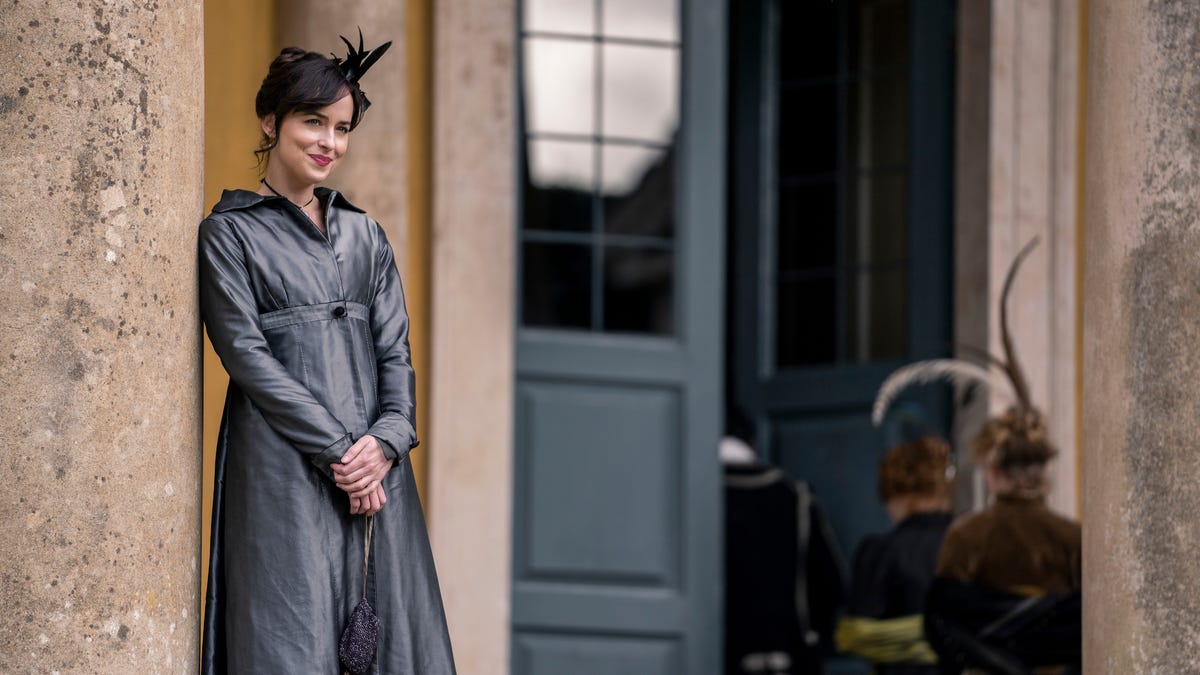
Director Carrie Cracknell’s Persuasion opens on what we’d expect to see in a Jane Austen-penned period piece: a beautiful, love-struck couple canoodling in a field, breeze blowing the wild wheatgrass ever so gently as the camera captures their loving embrace. But as quickly as that swoon-worthy Regency-era vision is established, it’s playfully upended by star Dakota Johnson gazing with dissatisfaction directly into the camera, taking a big swig of wine straight from the bottle, as her narration attempts to convince us she’s thriving. Suffice it to say that Cracknell wants audiences to know that their impending journey isn’t going to be like any of the film’s stuffy, slavish predecessors. And yet, thoroughly in line with the novel’s vibrant, jocular tone and adroit structure, her Persuasion combines the classic and the contemporary with innovative, resonant craftsmanship.
Unlike Austen heroines before her (in Sense And Sensibility and Pride And Prejudice), the Regency-era Anne Elliot (Johnson) doesn’t particularly like her snooty sisters, vapid beauty Elizabeth (Yolanda Kettle) and insufferable, hilarious Mary (Mia McKenna-Bruce). She also despises her vain father Sir Walter Elliot (Richard E. Grant), but tolerates the rudeness of all three, poking fun at them under her breath. Her marriage prospects have vanished since she was persuaded eight years prior to dump her one true love, low-ranking Naval officer Frederick Wentworth (Cosmo Jarvis). Because their union would’ve been solely for love, it was frowned upon by Anne’s family and closest confidant, Lady Russell (Nikki Amuka-Bird), whose transactional view of marriage has left Anne despondent and remorseful.
However, Anne’s outlook changes upon news of Wentworth’s impending return. Now a wealthy Captain and considered a hero for saving a beached whale, he’s got single ladies’ hearts a’ flutter. Anne is holding out hope that he’s open to rekindling their romance, but quickly discovers that Wentworth is more awkward and aloof than ever. Further complicating matters is the discovery that Louisa Musgrove (Nia Towle), Anne’s sister-in-law—whom she adores—has developed a crush on Wentworth. Yet once Anne’s shady cousin Mr. Elliot (Henry Golding) arrives and begins competing for her attention, she begins to develop more complicated feelings about the friendship that Wentworth proposes in lieu of a proper courtship.
Heretical as it may seem to Austen’s source material, breaking the fourth wall not only adds a contemporary edge to the female characters’ discussions of their social standing and worth, but also offers a brilliant way for the filmmakers to channel the source material’s use of a narrator. It grants us a window into Anne’s psyche, guiding us through internal and external conflicts. Whether it be her Fleabag-esque, Enola Holmes-like or her Ferris Bueller-lite expository dialogue and reactions, Johnson adeptly holds the audience’s attention, letting them in on the joke—or at least hinting at her despair. Cracknell mines these moments to showcase her heroine’s willfulness, wit and wisdom. Quick cutaways where Johnson’s glances mimic Jim from The Office serve to pull us in further. The actress is radiant, capably handling tonal shifts as well as the nuances that Cracknell cleverly tucks into the narrative’s margins.
G/O Media may get a commission
That said, even though this is very much “Not Your Mother’s” Jane Austen adaptation, the filmmakers wisely don’t alter the source material’s portrayals of class and character. Screenwriters Ron Bass and Alice Winslow retain much of the subversive, fundamental elements that made the original text so beloved, cheeky and subversive far beyond the boundaries of the time in which it was written. Anne’s perspective is always centered in the prose, but also in the juxtaposition between the nobility she ribs—folks like the insufferably arrogant, boorish Elliots, Musgroves, and Dalrymples—and those she considers having genuine merit, self-made men like Wentworth, Captain Harville (Edward Bluemel), and widower Captain Benwick (Afolabi Alli).
Universal themes of regret, grief, and second chances reach across time providing transcendent, heartrending touchstones. While the bulk of the complications arise out of “comedy of errors” style scenarios, the filmmakers make time for emotional resonance to land properly. Anne’s deep, albeit brief, connection with Benwick is woven through to her pivotal chat with Harville about love persevering. The poetic, handheld shots following Anne and Wentworth’s talk on the Lyme shoreline increase the immediacy and intimacy of their stunted romance—one we know is still burning, but both characters are too prideful to admit it.
Where its narrative qualities excel, the film’s aesthetic appeal is slightly shakier. Unlike other recent Austen-based features (such as 2020’s Emma, and even 2016’s Pride And Prejudice And Zombies), it lacks a necessary dimensionality in its imagery, doing a disservice to the below-the-line crew’s wonderful work. A dreaded, all-too-noticeable flatness, prevalent in many Netflix original films, keeps us from feeling totally immersed in this world. Joe Anderson’s cinematography, with its saturated tones and warm glow, cries out for a softer images with greater depth of field. John Paul Kelly’s production design and Marianne Agertoft’s costume designs, both of which photograph with a noticeable tactile feel, appear too crisp and new.
Despite these modern constraints, Cracknell’s adaptation crackles with life. Especially with an effervescent actress and hunky actor delivering compelling performances—in Johnson’s case, sometimes directly to the camera—this funny, poignant and enrapturing film gives ingenious new power to some of the Jane Austen’s greatest hits.
